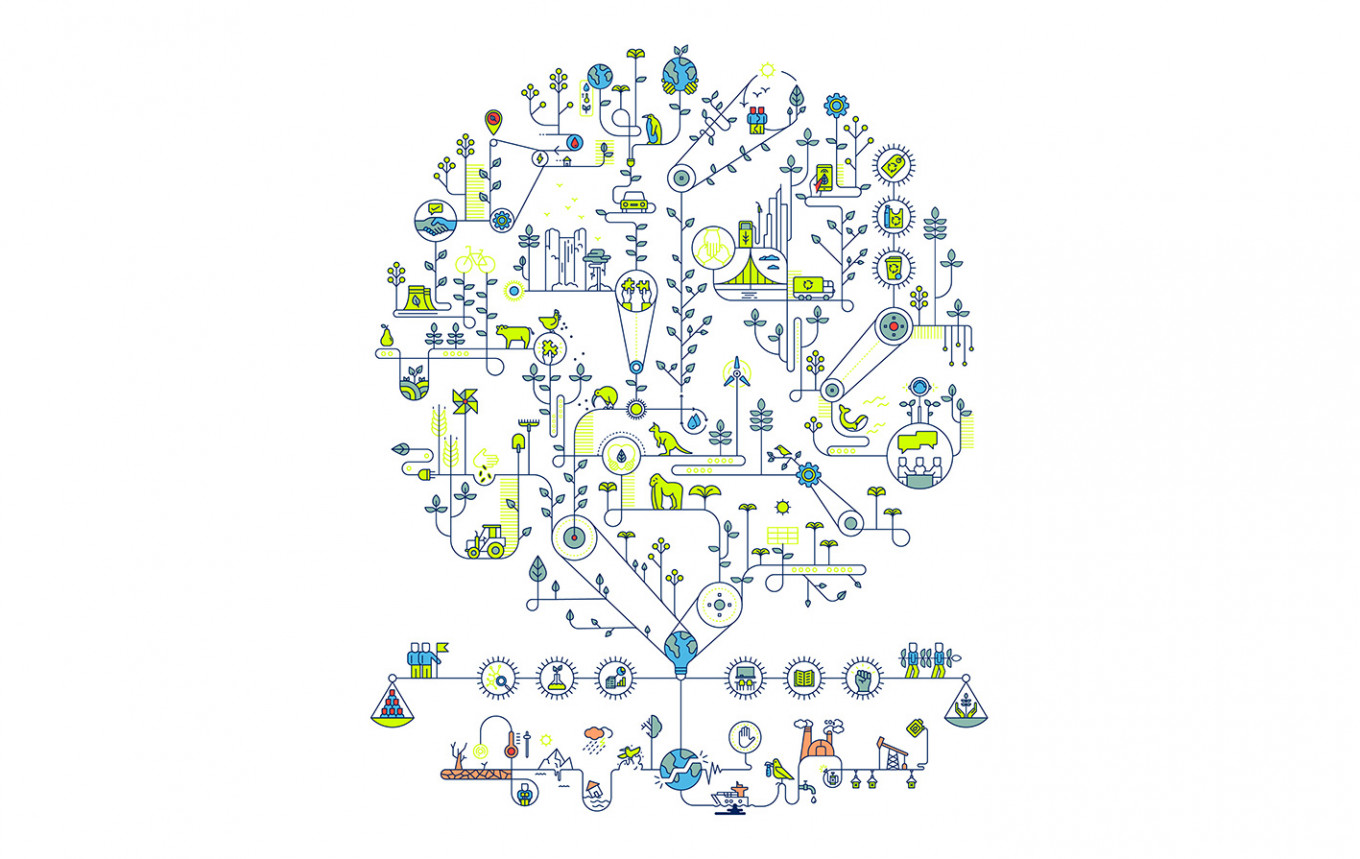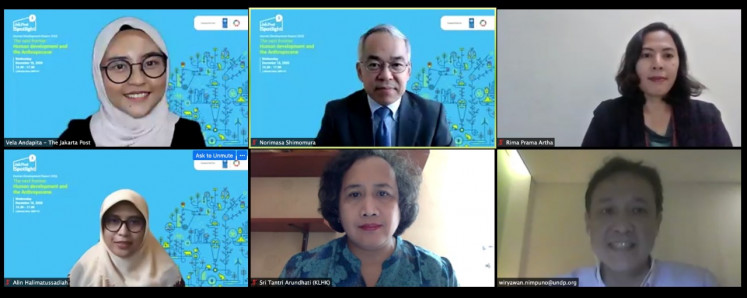Popular Reads
Top Results
Can't find what you're looking for?
View all search resultsPopular Reads
Top Results
Can't find what you're looking for?
View all search resultsPutting planet Earth into human development equation
Indian environmental activist Vandana Shiva once told a public forum that the words “ecology” and “economy” were actually rooted in the same ancient Greek word: “oikos”, which could refer to a household, house or family.
Change text size
Gift Premium Articles
to Anyone
 Balancing development programs with the ecology: The economic activities directed toward human development have put a lot of strain on our planet. The United Nations Development Programme (UNDP) launched the 30th anniversary edition of its Human Development Report, aptly titled The Next Frontier: Human Development and the Anthropocene, on Dec. 16. (Courtesy of UNDP)
Balancing development programs with the ecology: The economic activities directed toward human development have put a lot of strain on our planet. The United Nations Development Programme (UNDP) launched the 30th anniversary edition of its Human Development Report, aptly titled The Next Frontier: Human Development and the Anthropocene, on Dec. 16. (Courtesy of UNDP)
Sebastian Partogi
The Jakarta Post/Jakarta
Indian environmental activist Vandana Shiva once told a public forum that the words “ecology” and “economy” were actually rooted in the same ancient Greek word: “oikos”, which could refer to a household, house or family. While we are striving for human development index betterment through our economic activities, it is also essential for us to be mindful that we do not run our planet Earth into overdrive.
Being mindful of the need to achieve this balance, the United Nations Development Programme’s (UNDP) 30th anniversary edition of its annual Human Development Report (HDR) includes the “planet pressure” variable in its Human Development Index (HDI) measurement, thus coming up with a new concept called the planet and human development index (PHDI).
The UNDP deems it important to come up with this new concept, as the people and the planet enter an entirely new geological epoch: the Anthropocene or the Age of Humans, when human activities put tremendous strain on the planet's sustainability.
"As we enter this new era, all countries must strive to redesign their paths to progress by fully accounting for the dangerous pressure humans put on the planet and dismantle the gross imbalances of power and opportunity that prevent change," the UNDP stated in a press release.
For a more sustainable future: The Jakarta Post journalist Vela Andapita (top left) moderates a JakPost Spotlight webinar following the launch of the 2020 Human Development Report. The webinar featured the UN’s Indonesia resident representative Norimasa Shimomura (top center), UNDP Indonesia country economist Rima Prama Artha (top right), Environment and Forestry Ministry climate change adaptation director Sri Tantri Arundhati (bottom center) and Environmental Economics Research Group head Alin Halimatussadiah (bottom left) from the Social and Economic Research Institution of the University of Indonesia’s Economy and Business School (LPEM FEB UI). Interpreter Wiryawan Nimpuno (bottom right) was also part of the panel. During the webinar, panelists discussed the current state of sustainable development goals in Indonesia, as well as touching upon how Indonesia attempts to balance its economic development with environmental sustainability. (JP/Bayu Widhiatmoko)The UNDP has launched this report, titled “The Next Frontier: Human Development and the Anthropocene” to also open a public discussion regarding the issue during a JakPost Spotlight webinar.
Hosted by The Jakarta Post, the event featured UNDP Indonesia resident representative Norimasa Shimomura, the Environment and Forestry Ministry’s climate change adaptation director, Sri Tantri Arundhati, UNDP Indonesia country economist Rima Prama Artha as well as Environmental Economics Research Group head Alin Halimatussadiah from the Social and Economic Research Institution of the University of Indonesia’s Economy and Business School (LPEM FEB UI).
The event was moderated by Vela Andapita from The Jakarta Post.
Shimomura opened the webinar by presenting both good news and bad news. On the one hand, Indonesia currently ranks 107th out of 189 countries and territories in terms of HDI, a position it shares with Bolivia and the Philippines. Indonesia’s standing on the 2020 HDI ranking has improved from its previous position of 111th in 2019.
Broken down into its components, Indonesia’s HDI value at 0.718 puts the country in a high human development index category. The country has a life expectancy of 71.7 years, expected years of schooling of 13.6 years, with mean years of schooling amounting to 8.2 years as well as a gross national income (GNI) per capita of US$11,459 based on purchasing power parity (PPP).
However, as every country’s HDI has to be adjusted with the planetary pressures created by all domestic economic activities, Indonesia has dropped by 16 ranks in its international HDI position among the countries assessed for the PHDI.
Indonesia is not alone, as more than 50 countries dropped by several ranks under the PHDI measurement, and Indonesia’s planetary pressure-adjusted index value at 0.691 is still above the global average of 0.683.
It should therefore be understood that the carbon footprint, pollution and biodiversity loss emitted in various economic activities could threaten to undo all the progress a country has made in terms of human development.
The COVID-19 pandemic, which a lot of scientists believed happened due to the planetary imbalances brought about by the pursuit of endless economic growth at the expense of the environment, served as the most obvious example of how this happened in contemporary times: The pandemic has cost so many people the jobs and economic gains they had achieved.
Sri explained that, “when the environment is damaged, we will inevitably face a lot of disasters and in the end; the government will expend a lot of money to deal with these disasters.”
Yet, according to Alin, Indonesia still has a hard time overcoming its heavy reliance on the agricultural and mining sector for its economic growth, not to mention the lack of investment that still hampers the country’s renewable energy initiatives.
“At the same time, Indonesia’s consumption standards still follow a linear model, instead of a circular one,” Rima said, referring to the practice of prioritizing reusing, recycling and reducing waste in economic activities.
Alin pointed to a lack of clear-cut regulations as well as inter-ministerial coordination in Indonesia as the biggest challenges for the country’s effort to attain environmentally friendlier business practices.
“For instance, to bring down our greenhouse gas emissions, we need the ministries of energy and mineral resources, agriculture as well as environment and forestry to join forces,” Alin illustrated.
Sri noted that the government had already included its commitment on environmental issues -- especially in supporting the development of renewable energy -- in the 2020-2024 National Medium-Term Development Plan (RPJMN).
“The government now needs only to come up with clear strategies to implement this commitment,” Sri said.
Rima, meanwhile, added that the government also needed to come up with social protection measures that prioritized environmental sustainability.
“Instead of subsidizing fossil fuel, the government needs to find other social protection measures that can be better for our planet’s climate future,” she said. She added that the UNDP also partnered closely with the Indonesian government to come up with innovative financing schemes for renewable energy.










